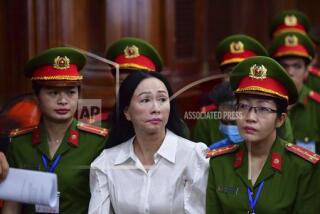Vietnam Names Leader of Old Guard as Party Chief Replacing Le Duan
- Share via
BANGKOK, Thailand — Truong Chinh, leader of Vietnam’s hard-line old guard, was named Monday as Communist Party chief, setting up a probable power struggle in Hanoi over the next few months.
Chinh was unanimously chosen by a special meeting of the party Central Committee to replace Le Duan, who died last Thursday, Voice of Vietnam radio reported.
Chinh retains his post as chairman of the Council of State, giving him both the top party and governmental offices, but at 79 he is seen by analysts here as a transitional leader.
Party Congress Due
The prompt appointment may keep the leadership struggle under wraps until a party congress scheduled for November or December, when Chinh’s conservative followers will face reformist elements bent on reviving the country’s economy through incentive programs.
Chinh’s selection came on the eve of today’s state funeral for Duan, also 79.
“More than ever the (party) must turn grief into strength,” Chinh said in brief acceptance remarks.
He urged the 55 million Vietnamese, the army and the party to perform “urgent” tasks to bolster the economy and security, Vietnam radio said.
Soviet Premier on Hand
As the Central Committee met, Soviet Premier Nikolai I. Ryzhkov and Communist Party leaders Heng Samrin of Cambodia and Kaysone Phomvihan of Laos paid respects in Hanoi at the bier of Duan. they were the only foreign leaders invited to the funeral.
Chinh, Duan, Premier Pham Van Dong and Politburo member Le Duc Tho guided the country through the end of the Vietnam War and the unified country’s faltering first decade after the death of Ho Chi Minh, the father of Vietnamese communism, in 1969. Chinh and Pham Van Dong, 80, are both reported to be ailing, and prior to Duan’s death all three were rumored ready to step aside at the party congress.
The aged leaders, however, represent distinct camps among the younger party members. Chinh is a promoter of orthodox Marxist policy and Tho, 74, is seen as the leader of the reformists. Even if power passes to a younger group, analysts here say, it is likely to go to men in their 60s, for the Vietnamese party has traditionally been marked by caution.
Chinh, like Duan and Dong, joined Ho in the formation of the Indochinese Communist Party in the early 1930s and followed him in the ensuing wars against Japanese occupation, French colonialism and the American-backed government in South Vietnam.
Chinh, a northerner, was once seen as Ho’s political heir. In 1941 he was named Vietnamese party chief and held the post for 15 years, losing it when his harsh land reform programs in the north proved unpopular in the years immediately after the French lost power in Vietnam and the country was divided into north and south.
Confession by Chinh
Chinh publicly confessed to “leftist deviationism,” but remained in the Politburo and was named head of the National Assembly in 1960 and chairman of the Council of State in 1981. He was jailed by the French in the 1930s, as were most of the old guard leaders, and he later fled to China where he spent most of the World War II years.
Like Duan, Chinh has had little international exposure. He developed an early reputation as a theoretician and is best known for his efforts at party organization. But like all the old revolutionaries of Vietnam, men who have led the country through more than four decades of almost continuous war, he has been stymied by the problems of reconstruction and development in peacetime.
As an advocate of strong party control, Chinh is seen by some analysts as a barrier to reforms that could energize the economy. In the past two years, reforms have been instituted at the provincial level with some success, but each advance at the province level is a threat to the power of the central government in Hanoi and poses a challenge to Marxist orthodoxy.
That dilemma, along with top leadership, is expected to be the primary subject of the party congress.
More to Read
Sign up for Essential California
The most important California stories and recommendations in your inbox every morning.
You may occasionally receive promotional content from the Los Angeles Times.













